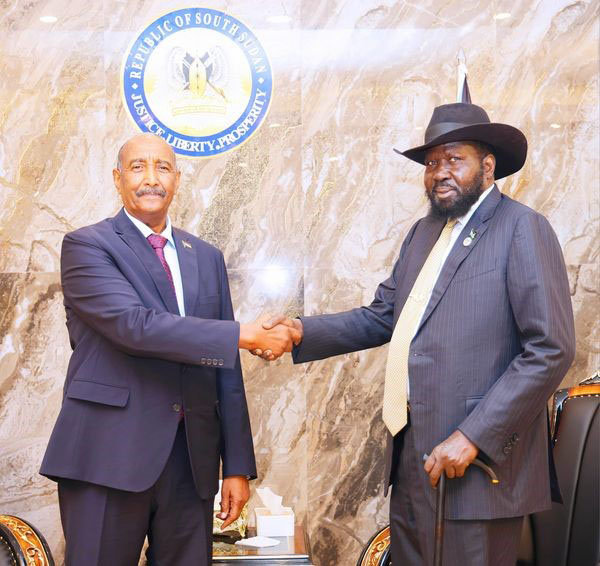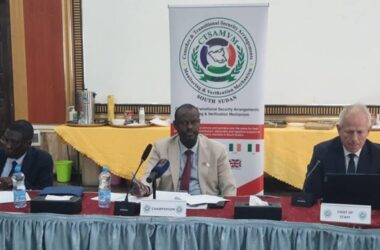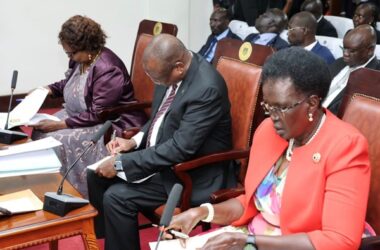By Yiep Joseph
President Salva Kiir hosted Chairman of Sudan’s Sovereign Council, Abdel Fattah el Burhan, in Juba and re-strategized models to bring peace to a pathway for the flow of oil production.
As the war continues in neighboring Sudan, South Sudan, as an immediate neighbor, continues to face challenges topped by the complete interruption of oil flow in some areas.
Besides discussing political ties with both warring parties in Sudan, South Sudanese leaders recently gained hope when the reopening of oil production was announced; however, such a plan seems to be receiving little progress due to continued conflict.
According to the presidential press unit, Burhan’s visit to Juba centred on oil resumption, among other items that are of mutual benefit to both countries.
“The meeting of the two principals is expected to focus on key areas, including resumption of oil flow, economic cooperation, and cross-border security, among other critical issues of mutual concern,” the statement partly read.
“Burhan’s visit to Juba comes as both nations re-strategize to deepen their ties and address issues crucial for regional stability along their common border,” it read.
Meanwhile, after indoor talks, President Salva Kiir and Abdel Fattah Al-Burhan discussed ways to enhance regional peace and stability through constructive dialogue and mutual cooperation.
According to the statement obtained from president press unit the Acting Undersecretary in the Ministry of Foreign Affairs and International Cooperation Majak Philemon Majok revealed that the talks deliberated on oil resumption.
“The meeting of the two principals revolved on resumption of oil flow, economic cooperation, and cross-border security, cultural exchange among other critical issues of national importance” the statement read in part.
The Undersecretary in the Sudanese Ministry of Foreign Affairs Hussein Elamin said al-Burhan briefed President Kiir on the current situation in Sudan, as the war rages on.
Meanwhile, during the closing of the 8th Governors Forum last week, South Sudan President Salva Kiir blamed oil interruption as reasons for the delay in salaries in the country.
The government workforce of civil servants and organized forces have been without salaries for almost a year amidst the economic situation. Although the country’s revenue authority collected enough that can pay the workforce, the finance ministers blamed oil interruption.
Kiir revealed that the Sudanese Burhan was to visit the country, adding that the oil sector faces two challenges, the conflict in Sudan and the exit of Malaysian oil giant PETRONAS from South Sudan’s oil sector.
“Our economy is in distress. The oil field of Paloch, which is the highest revenue earner for the national government, is facing a double crisis. The operation was interrupted by the war in Sudan and the consequent withdrawal of PETRONAS,” Kiir said.
However, the ongoing war in Sudan has caused major disruptions to the oil pipelines that transport crude oil from South Sudan to international markets.
Earlier this year, damage occurred to a crucial pipeline that transports two-thirds of the nation’s oil output.
Kiir said his administration is engaging the warring parties in Sudan to allow repairs in the oil field.
“I’m fully engaging our brothers in Sudan to allow unfettered access to engineers and the flow of the materials to oil fields,” Kiir said.
Resumption of oil flow
In October South Sudan declared resumption of production, citing readiness to pump crude oil for export through Port Sudan as damaged facilities were fixed.
Tut Gatluak Manime, who headed a delegation that travelled to Port Sudan to discuss resuming oil exports, said officials had visited all the production sites along the pipeline.
“We reviewed all the pipelines; some were frozen but were cleaned with hot water and some chemicals, and now the pipelines are ready for full production of oil from South Sudan,” he said.
Also, officials from the Ministry of Petroleum of both countries visited the oil production sites and confirmed readiness for oil production to resume.
This was concluded with a workshop in Juba that brought all the institutions tasked with oil production, companies, and other stakeholders together; however, till now, the production has not yet started while the war continues in Sudan.



